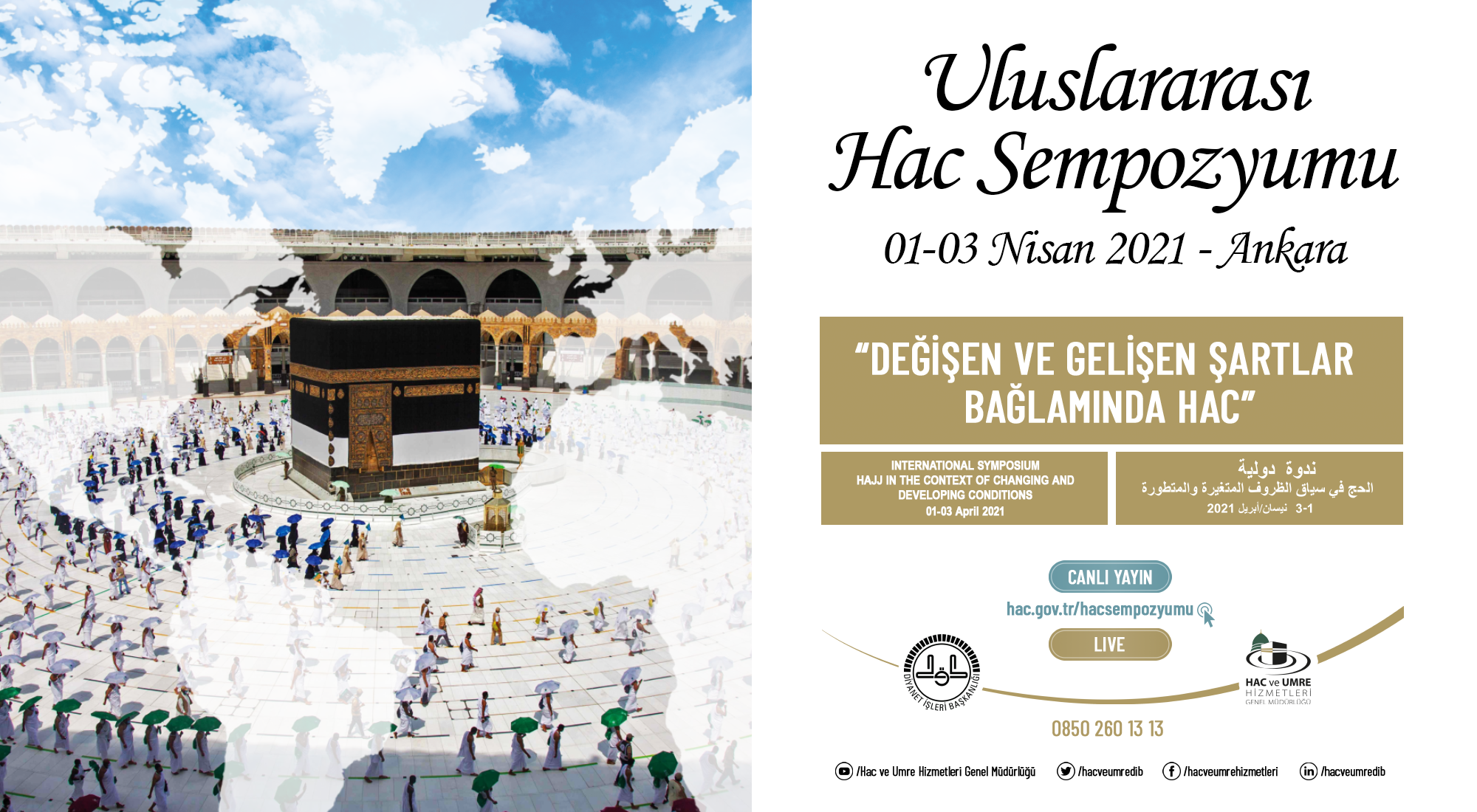

For the symposium program click here...
Symposium Framework
In the lives of the believers, each of the worships has an unquestionable place in the context of relationship between Allah (swt) and His servants. Each act of the worship carries a different meaning in one’s relationship with his/her Creator and other people. As a deep-rooted worship, Hajj is one of the most important acts of worship in terms of the relationship between Allah (swt) and His servants and the relationship of people with each other in terms of leaving deep traces in the spiritual world of believers as well as reinforcing the brotherhood of faith and religious identity. Hajj is a multifaceted act of worship that includes material and spiritual abundance. One of the five basic pillars of Islam, Hajj is different from other types of worship due to some difficulties in its practice as it is fulfilled at a special time and place. In the same time, Hajj is an exceptional worship that includes the visits of different symbols in different places and includes various experiences, emotions and excitements that may be experienced only once in a lifetime.
Likewise, although Hajj is perceived as an individual responsibility at first glance, it has an international aspect in terms of its fulfillment. On the basis of these visits to sacred places for the purpose of fulfilling the duty of pilgrimage, there is a deep awareness of belief, worship, history and culture. The main objective is to reflect this feeling, understanding and mentality to today’s people and keep those morals alive.
The Presidency of Religious Affairs of Turkey considers the Hajj organization as a sacred duty that includes many responsibilities, rather than a travel between countries. Within the framework of these responsibilities, the Hajj worship requires a large organization. For this reason, while planning all the services for the Hajj organization, the main purpose is that the pilgrims can perform this worship in comfort, peace and security, in a way that suits the honor and reputation of our nation. As a matter of fact, as an act of worship whose main focus is practice and guidance, Hajj has come within a discipline and organization until today. Hajj services have been carried out by the Presidency of Religious Affairs in Turkey since 1979, and after 1988, together with travel agencies under the supervision, inspection and guidance of the Presidency. The Presidency of Religious Affairs has nearly half a century of experience, knowledge and achievement in Hajj worship and organization.
Due to the fact that it is held annually, Hajj organizations are one of the biggest organizations our state organizes abroad. In this context, the Presidency of Religious Affairs aims for our citizens to return to our country with great spiritual gains beyond providing transportation, health, accommodation and security needs of them. With this motivation, it has been decided by the Presidency of Religious Affairs to organize an international symposium between April 01-03, 2021 under the title of “Hajj in the Context of Changing and Developing Conditions” in order to contribute to and increase the quality of the services.
Purpose of the Symposium
This symposium aims to evaluate the Hajj services currently performed in every aspect and to provide a new horizon and vision to Hajj services within the framework of today’s conditions; to evaluate the developing and changing conditions related to the Hajj organization; to review the current issues related to the organization; and to develop training, guidance, communication, written and visual publications and materials related to the field.
⦁ Evaluation of the concept of istitaʻah in today’s conditions
⦁ Pilgrimage of children who have not reached puberty
⦁ Cases that can be evaluated within the scope of ihsar and fawat today
⦁ Responsibility of Hajj in terms of today’s economic conditions
⦁ Issues related to women in the context of privacy
⦁ Evaluation of the current quota application in terms of obligation conditions
⦁ Hajj by proxy
⦁ Complete or partial loss of mental health in the context of preventing Hajj
⦁ Hajj in the context of physical disabilities and other illnesses
⦁ Hajj during the pandemic period and evaluation of measures taken
⦁ Entering ihram outside the determined sharʻi miqats
⦁ Muzdalifah waqfa area and time for waqfa
⦁ Accommodation in Mina
⦁ Time of stoning the devil
⦁ Benefiting from different ijtihads on ihram bans and penalties
⦁ Practices related to women
⦁ Hady qurbani in terms of time, place and proxy
⦁ Length of stay in Medina
⦁ Period of the Prophet (saw) and Four Caliphs
⦁ Umayyads and Abbasids Period
⦁ Periof of the Seljuks
⦁ Ottoman Period
⦁ Republic Period (between 1923-1977)
⦁ The first term that started with the Presidency of Religious Affairs (1979-1988)
⦁ Presidency of Religious Affairs and travel agencies era (1988 and after)
⦁ Hajj in the context of Islamic brotherhood
⦁ Contribution of Hajj to the change and transformation of social life
⦁ The concepts of “Hajj” and “being a pilgrim” in the context of changing the social status of the individual
⦁ The impact of cultural factors on the fulfillment of Hajj
⦁ Effects of Hajj on human psychology
⦁ Guidance and educational activities before Hajj
⦁ Different approaches in the training of personnel who work in Hajj organizations of countries
⦁ Models that countries utilize to educate pilgrims
⦁ Guidance during Hajj
⦁ Educational activities after returning from Hajj
⦁ Visual, digital publications and mobile applications on education and guidance
⦁ Evaluation of the process of determining the pilgrims {queue, draw of lots (qurrah) etc.}, registration procedures, categories, health services and pilgrim profiles from different perspectives (age, gender, education etc.)
⦁ Evaluation of domestic services
⦁ Evaluation of services abroad
⦁ Evaluation of the services carried out in cooperation by the Presidency of Religious Affairs and TÜRSAB (Association of Turkish Travel Agencies)
Honorary Chairman of the Symposium
Prof. Dr. Ali ERBAŞ: President of the Presidency of Religious Affairs of Turkey
Scientific Advisory Board
Prof. Abdurrahman HAÇKALI, Chairman of the High Board of Religious Affairs, Turkey
Prof. Huriye MARTI, Vice President of Religious Affairs, Turkey
Prof.İbrahim Hilmi KARSLI, Vice President of Religious Affairs, Turkey
Dr. Selim ARGUN, Vice President of Religious Affairs, Turkey
Dr. Burhan İŞLİYEN, Vice President of Religious Affairs, Turkey
Assoc. Prof. Fatih KURT, Director General of Religious Publications, Turkey
Prof. Abdullah KAHRAMAN, Member of the High Board of Religious Affairs, Turkey
Prof. Ahmet YAMAN, Necmettin Erbakan University, Turkey
Prof. Ali AKPINAR, Necmettin Erbakan University, Turkey
Prof Enbiya YILDIRIM, Member of the High Board of Religious Affairs, Turkey
Prof. Fikret KARAMAN, İnönü University, Turkey
Prof. Hacı Mehmet GÜNAY, Member of the High Board of Religious Affairs, Turkey
Prof. Hasan Süheyl Abbud Ahmet El-Cümeylî, Imam Azam University, Iraq.
Prof. İbrahim Kafi DÖNMEZ, İstanbul 29 Mayıs University, Turkey
Prof. İsmail KARAGÖZ, Düzce University, Turkey
Prof. Mehmet Emin MAŞALI, İstanbul Provincial Mufti, Turkey
Prof. Muhammed AYDIN, Qatar University, Qatar.
Prof. Muharrem ÖNDER, Yalova University, Turkey.
Prof. Mürteza BEDİR, İstanbul University, Turkey
Prof. Raşit KÜÇÜK, Retired Chairman of the High Board of Religious Affairs, Turkey
Prof. Sabri ERTURHAN, Cumhuriyet University, Turkey
Prof. Salah Muhammed Salim Ebu'l-Hacc, The World Islamic Sciences and Education University, Jordan
Prof. Şamil DAĞCI, Ankara University, Turkey
Dr. Abdorrahman b. Moammer Es-Senûsî El-Cezâirî, University of Algiers, Algeria.
Dr. Ekrem KELEŞ, Retired Chairman of the High Board of Religious Affairs, Turkey
Dr. Hüseyin KAYAPINAR, Retired Chairman of the High Board of Religious Affairs, Turkey
Dr. M. Bülent DADAŞ, Deputy Chairman of the High Board of Religious Affairs, Turkey
Dr. Refiullah Ata, Celalabad University, Afganistan
Dr. Yusuf DOĞAN, Ankara Provincial Mufti, Turkey
Dr. Zahir Abdülhamid, University of the Holy Quran and Islamic Sciences, Sudan
Editorial Board
Osman TIRAŞÇI : Vice President of Religious Affairs(Chairman)
Remzi BİRCAN : Director General of Hajj and Umrah Services
Esma ERTEN : Head of Hajj and Umrah Education Department
Süleyman SARI : Head of Hajj Services Department
Tuncay ALTINIŞIK : Religious Affairs Specialist
Dr. Harun Dündar KARAHAN : Presidential Preacher
Calendar
Symposium Date : April 01-03, 2021
Deadline for Submission of Abstracts : January 25, 2021
Announcement of Accepted Abstracts : February 15, 2021
Deadline for Submission of Papers : March 22, 2021
Announcement of the Symposium Program : March 26, 2021
Printing of Symposium Papers : 2021
Turkish, English and Arabic.
The symposium shall be held in Ankara. Depending on the course of the pandemic, the symposium can be held in a physical environment and/or online.
1. Papers shall be scientific and genuine.
2. Paper abstracts shall outline the subject and should be between 300 and 400 words.
3. Participation application and submission of the abstracts will be through https://hac.gov.tr/HWebIslemler/Sayfalar/Sempozyum/Basvuru
4. Papers shall be between 5000 and 7000 words.
5. Papers presentation in sessions shall be limited to 20 minutes.
6. Papers should be prepared within the frame of the spelling rules announced on hac.gov.tr/hacsempozyumu
7. Accepted papers shall be announced in the announcements section of hac.gov.tr/hacsempozyumu
When necessary, transportation, accommodation and hospitality expenses of the presenters shall be covered by the Presidency of Religious Affairs.
Please click here to see
We would be honored to see valuable scientists and researchers among us at the “Hajj in the Context of Changing and Developing Conditions ”Symposium.
For the symposium program click here...
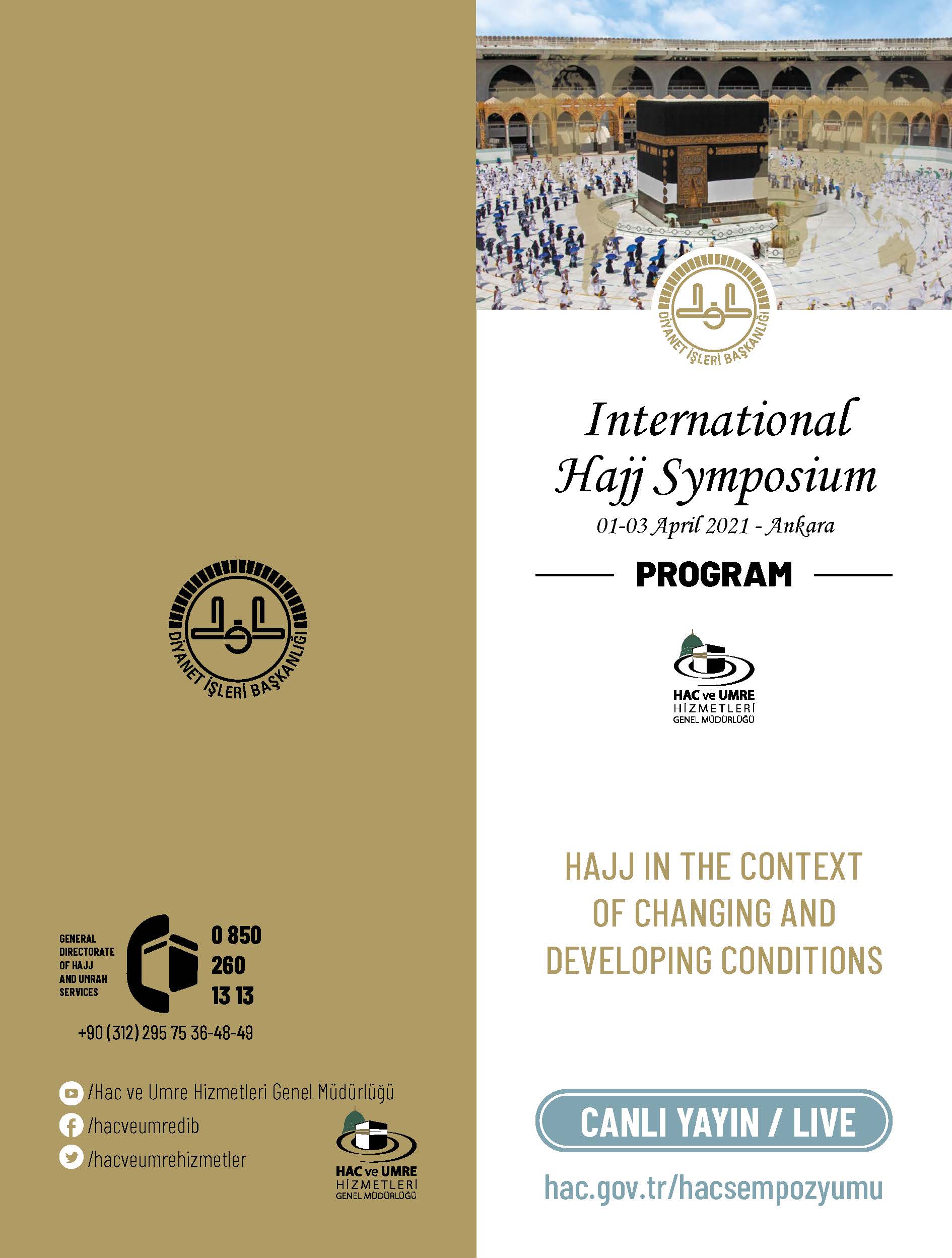
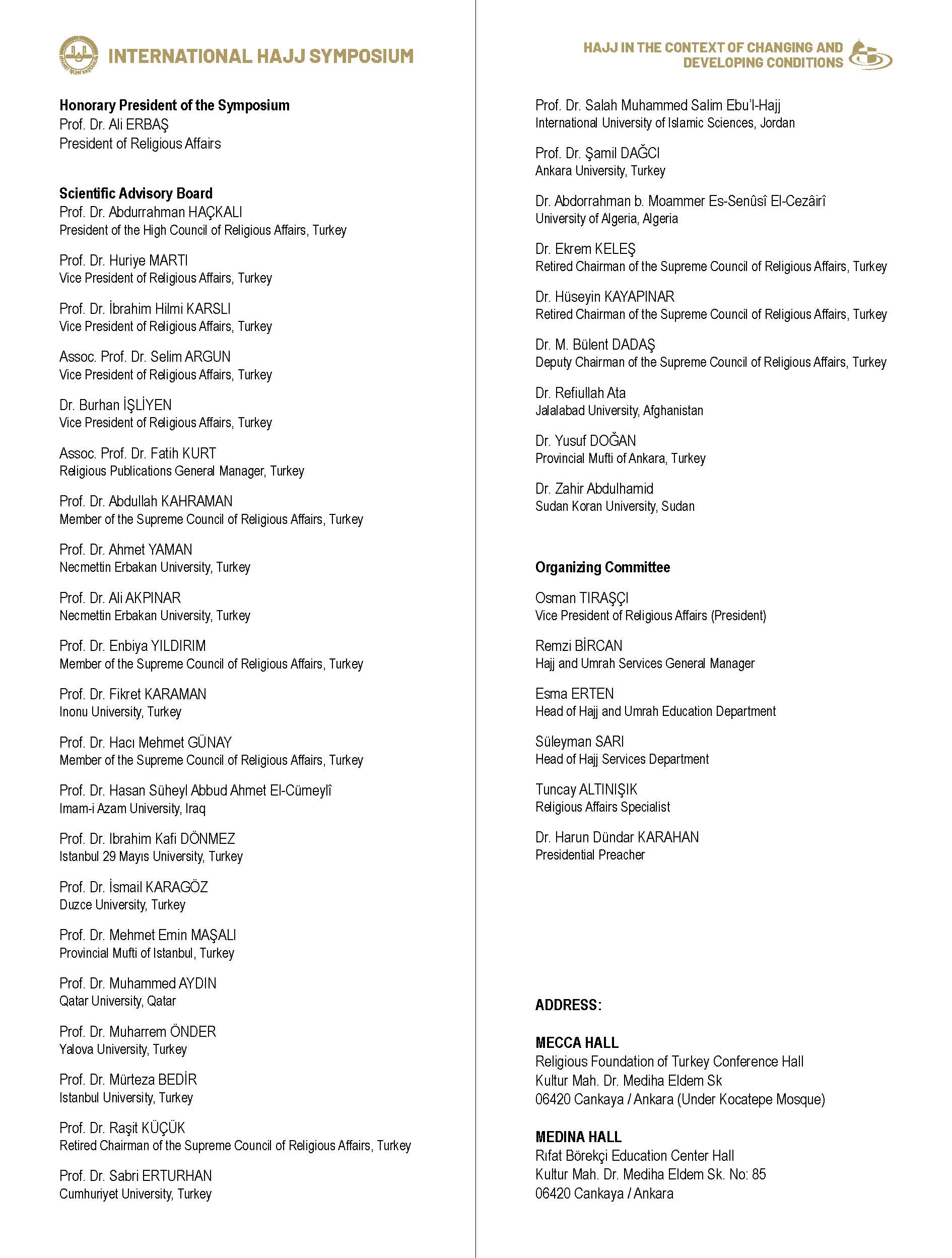
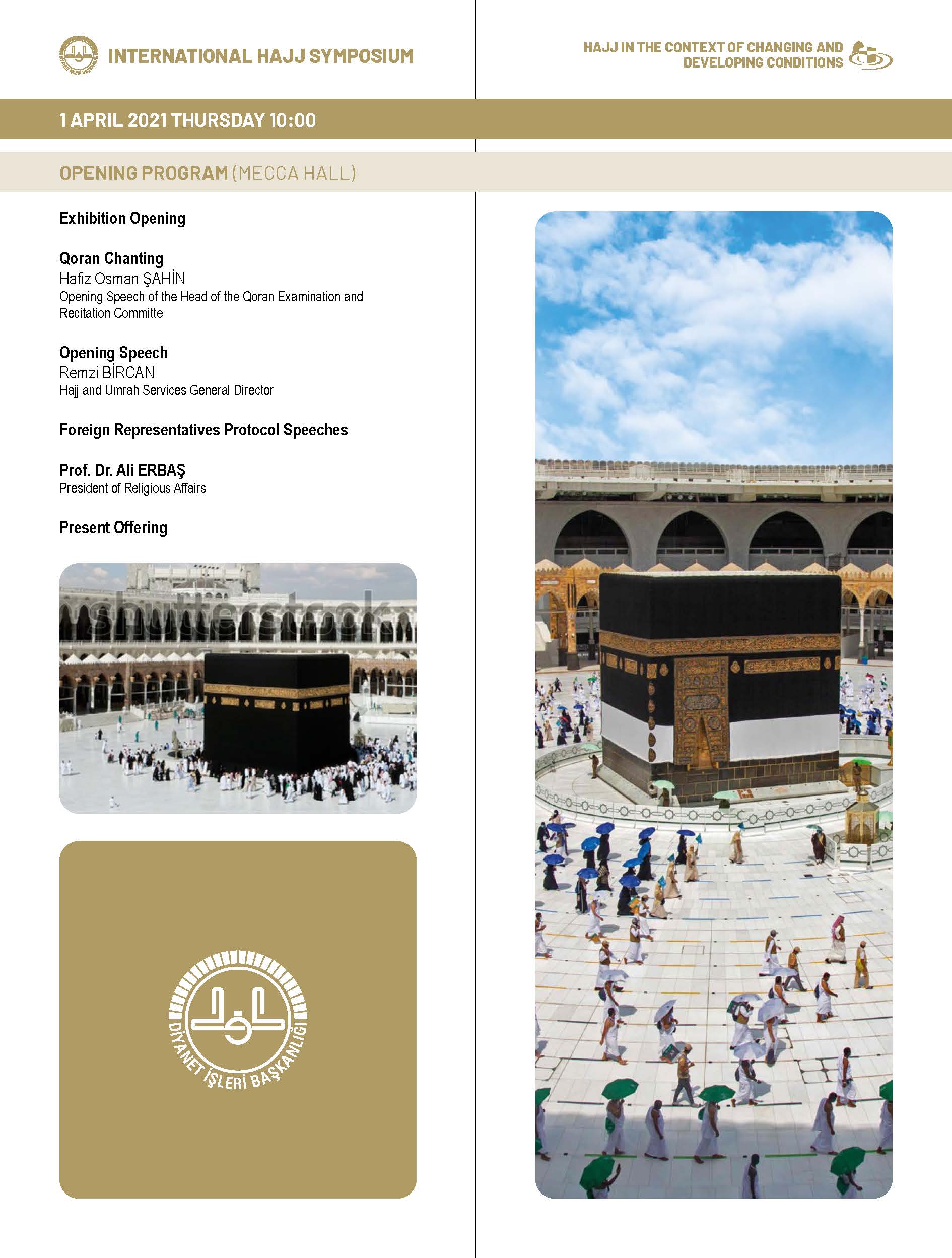
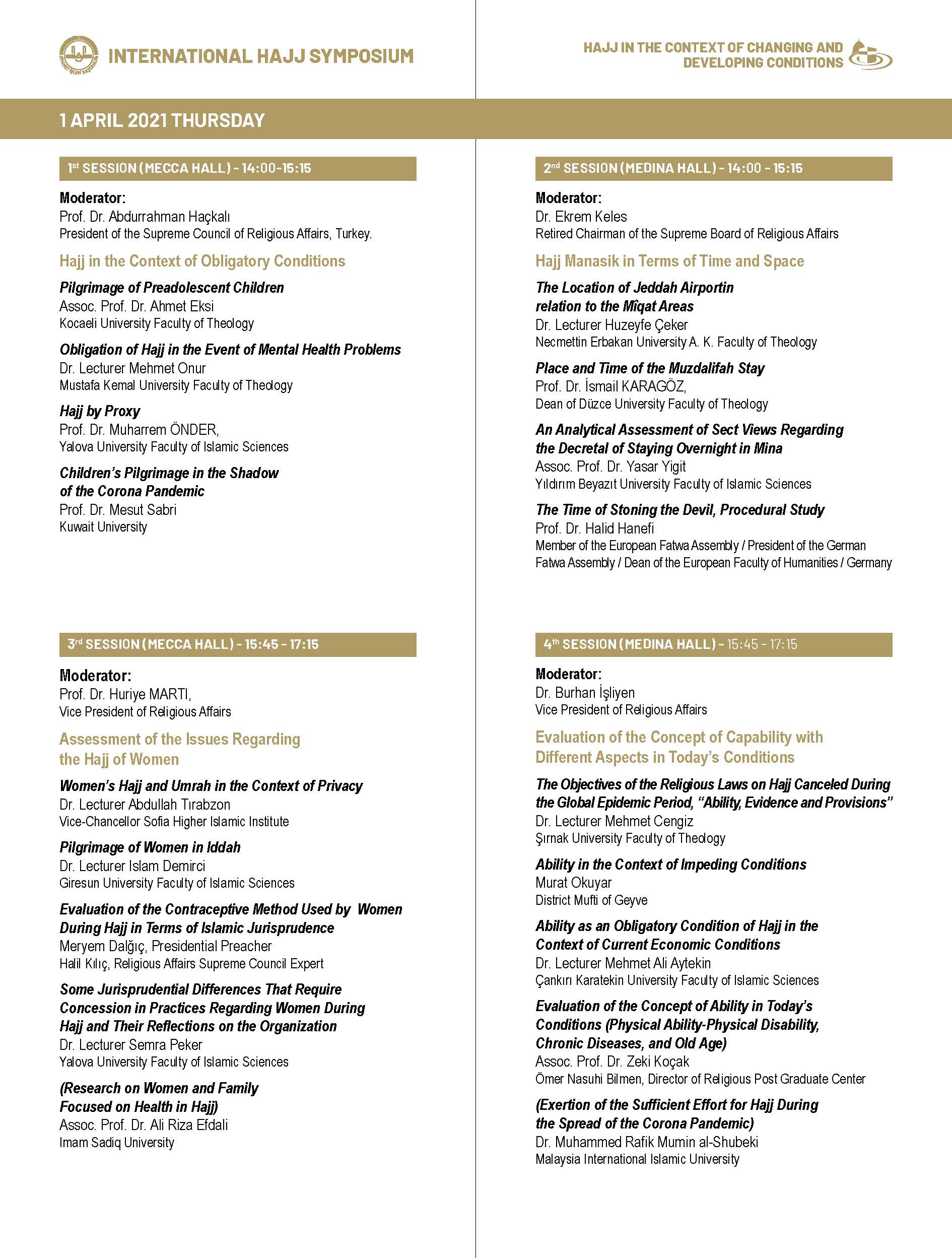
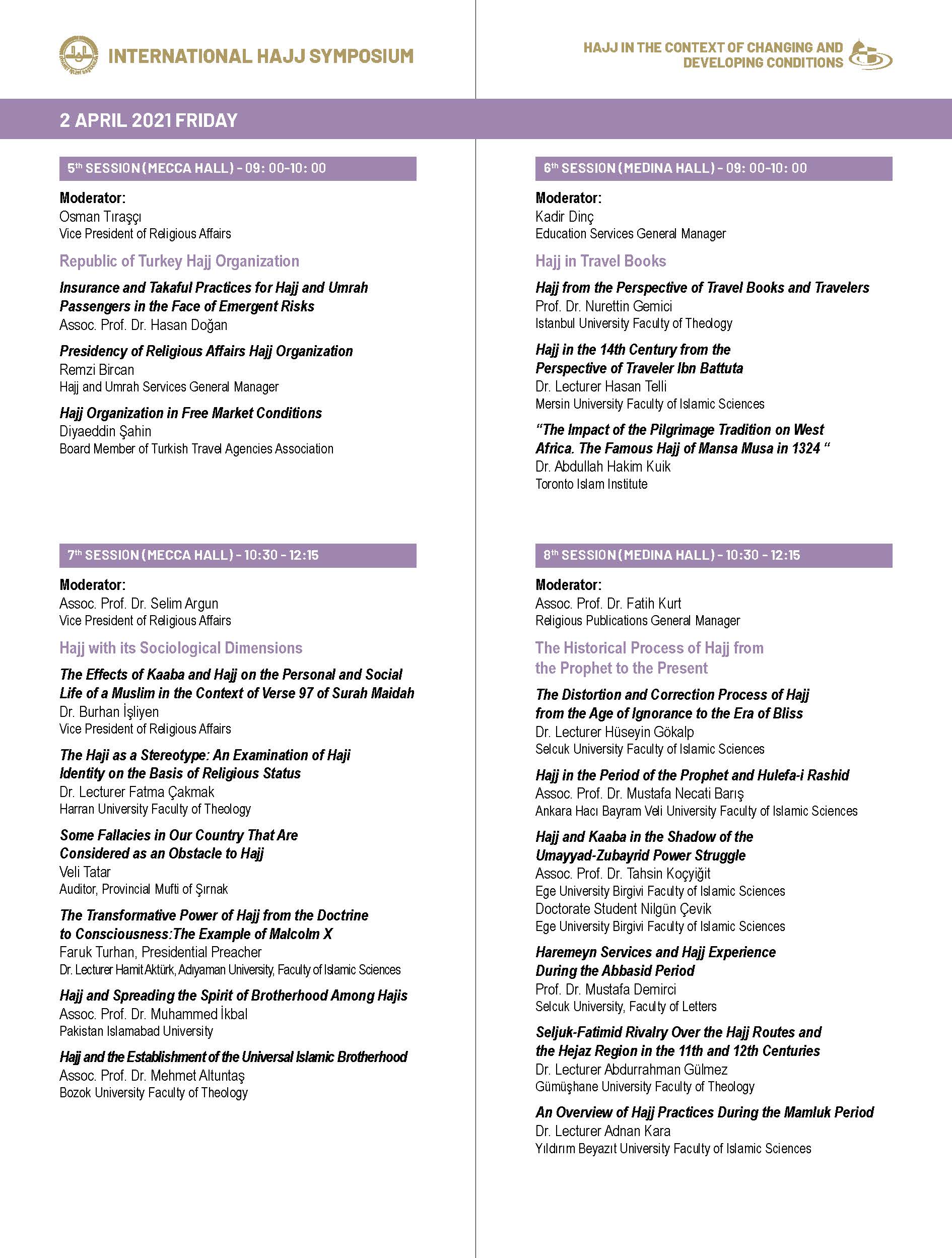
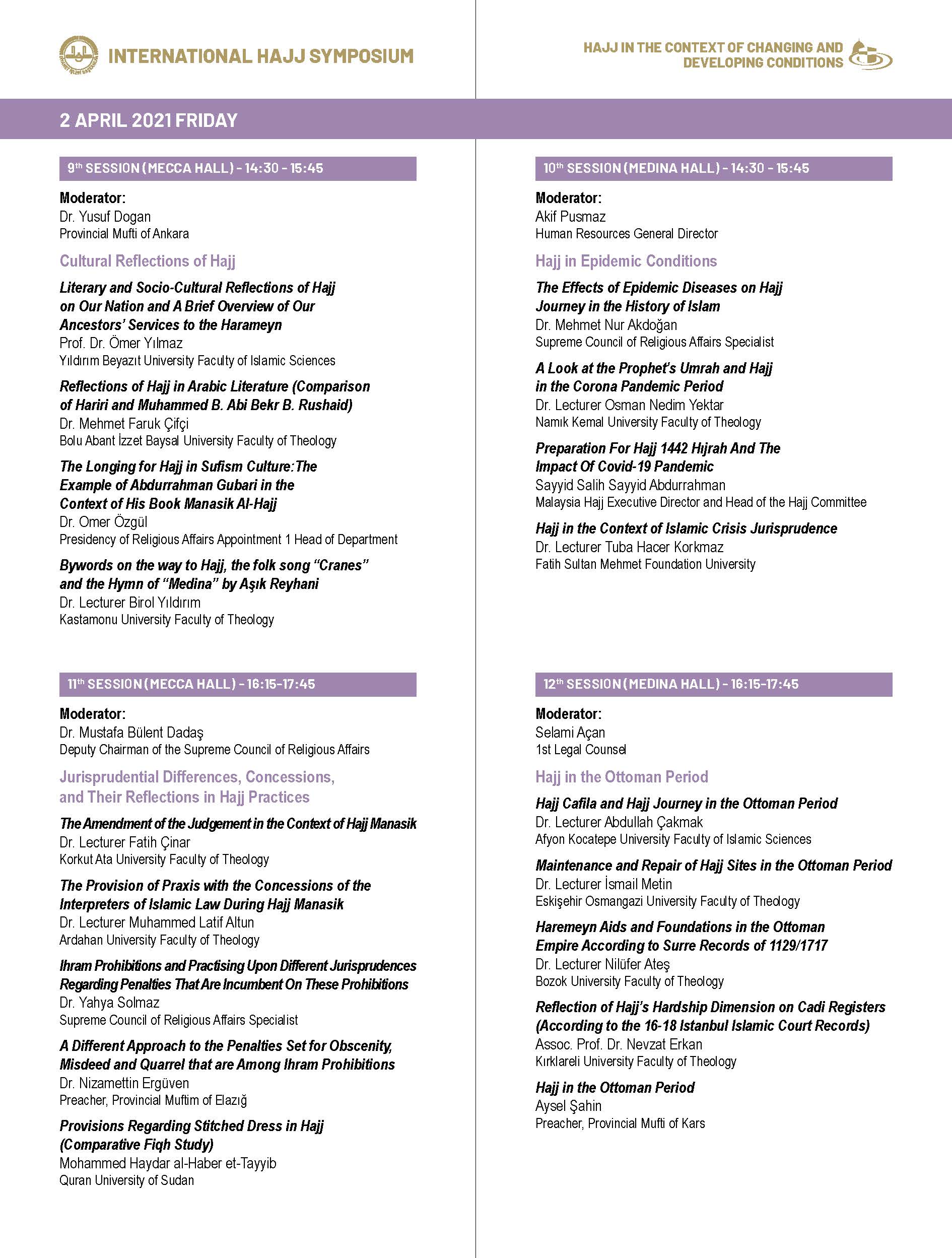
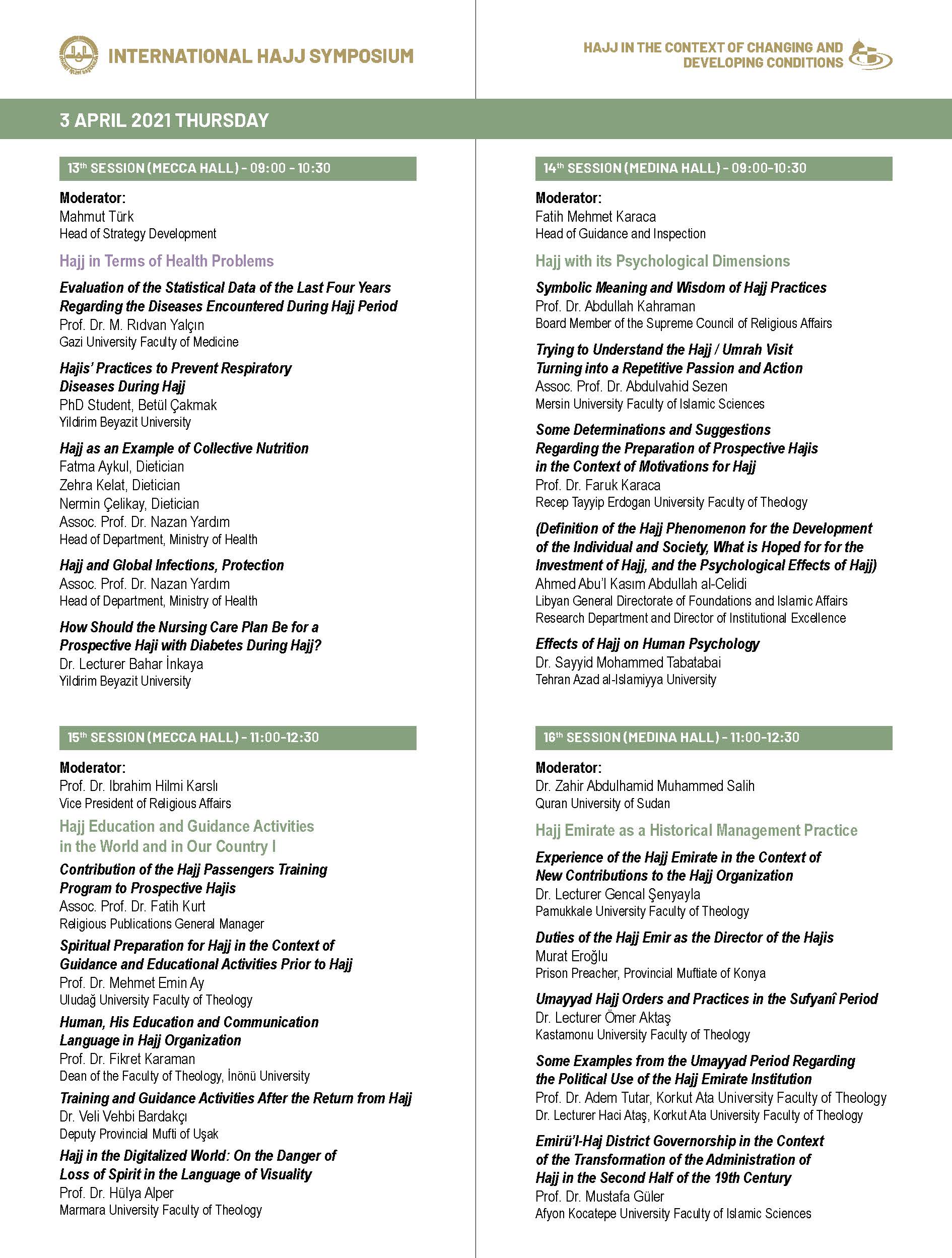
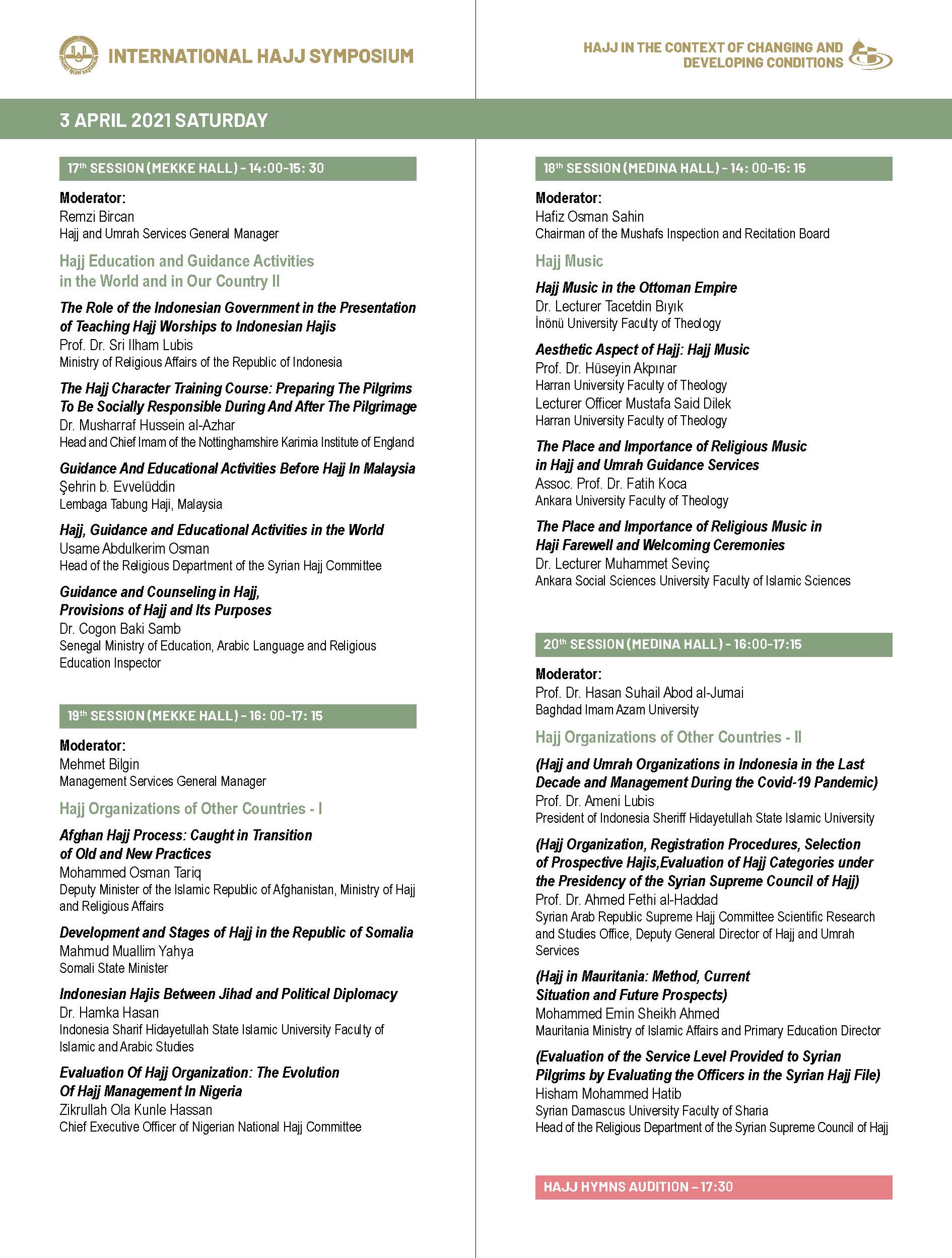
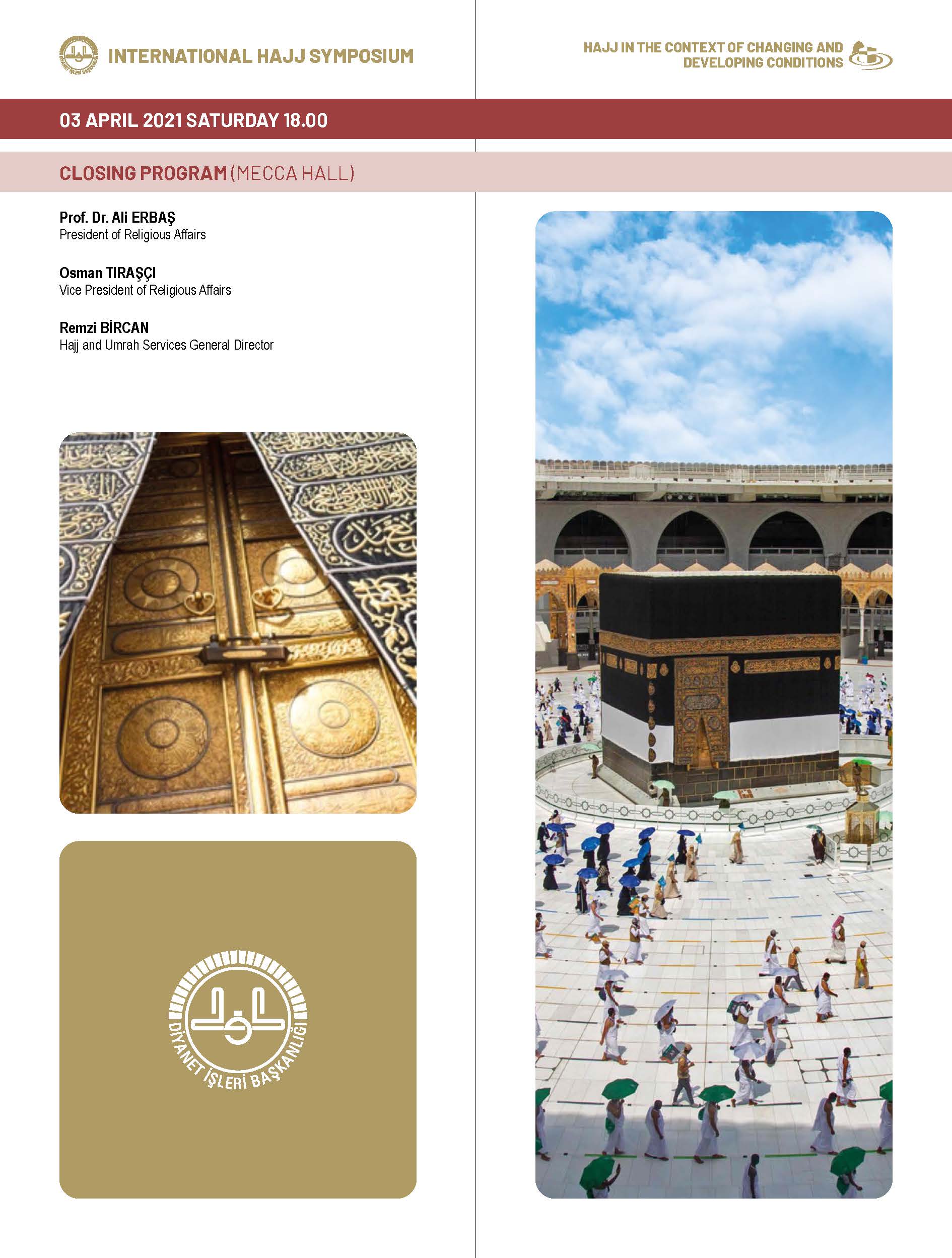
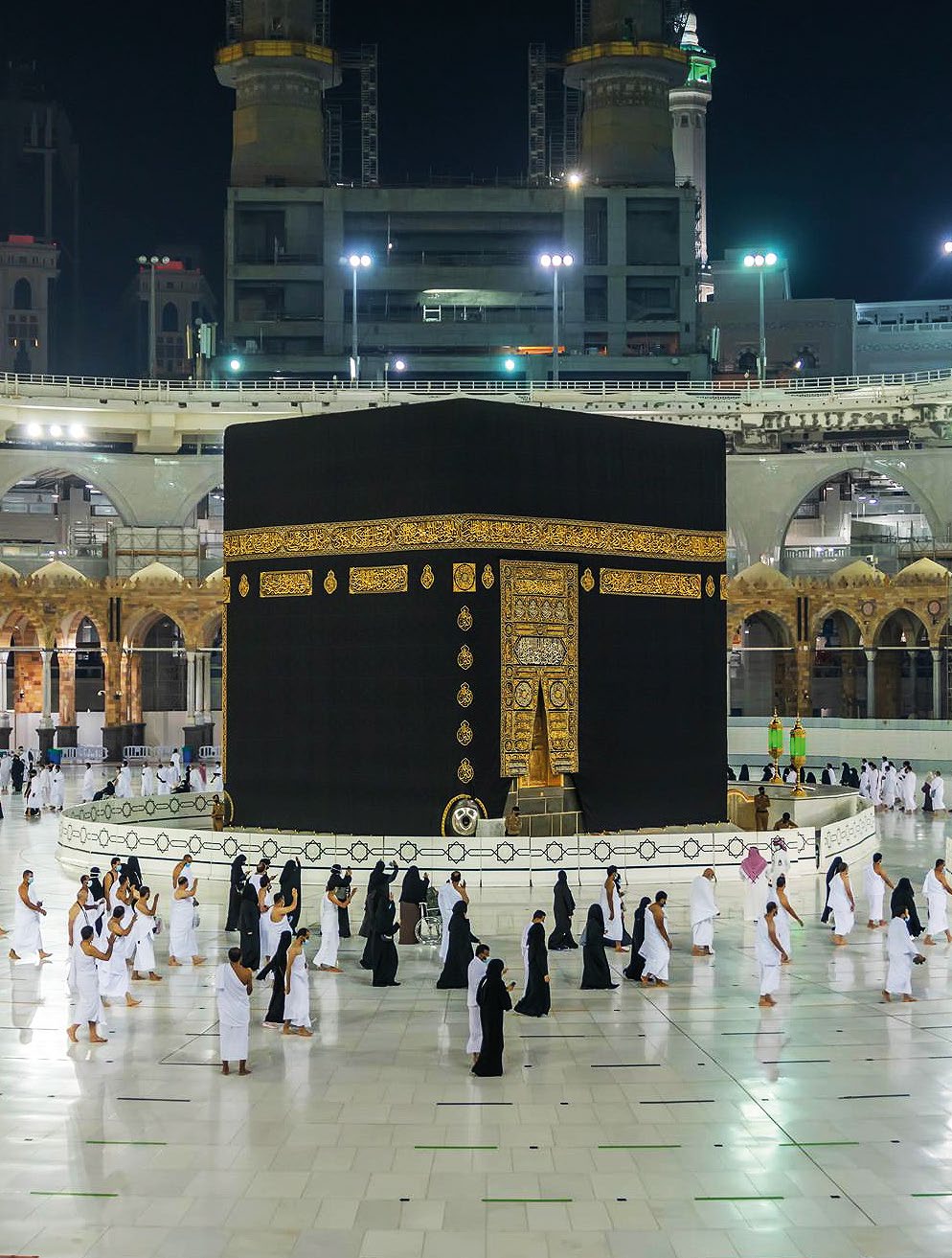
Diyanet İşleri Başkanlığı, Hac ve Umre Hizmetleri Genel Müdürlüğü
Üniversiteler Mahallesi Dumlupınar Bulvarı No:147/A 06800 Çankaya/ANKARA
Phone : (+90) 312 295 7536 - (+90) 312 295 7548-49
GSM : (+90) 530 168 5775
Fax : (+90) 312 287 6274
E-mail : hacsempozyum@diyanet.gov.tr
Web : hac.gov.tr/hacsempozyumu